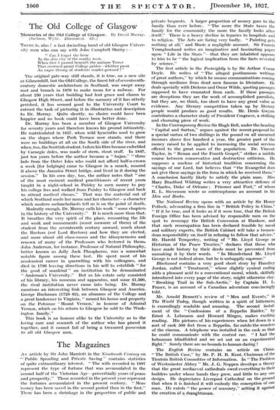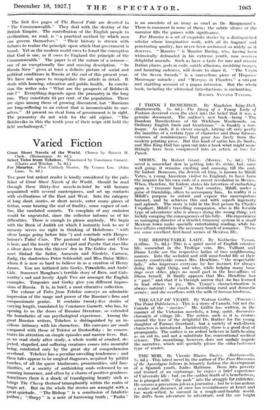The Magazines AN article by Sir John Marriott in the
Nineteenth Century on '" Public Spending and Private Saving" contains statistics 'of quite extraordinary interest. "The wills recorded in 1897 represent the type of fortune that was accumulated in the second half of the Victorian Age—proverbially years of peace and prosperity." Those recorded in the present year represent the fortunes accumulated in the present century. "More 'money has been saved in the second period than in the first." There has been a shrinkage in the proportion of public and
private bequests. A larger proportion of money goes to. the family than ever " before.. "The more :the State taxes the family for the community the more the family looks after itself." There is a heavy decline in legacies to hospitals and to religion. The Arts are 'faring very badly. "Painting gets nothing at all," and Music a negligible amount. Sir Francis Younghusband writes an imaginative and fascinating paper upon "Life in the Stars "—that they are inhabited appears to him to be "the logical implication from the facts revealed by science."
The first article in the Fortnightly is by Sir Arthur Conan Doyle. He writes of "The alleged posthumous writings of great authors," by which he means communications coming through mediums from dead men famous in literature. He deals specially with Dickens and Oscar Wilde, quoting passages supposed to have emanated from each. If these passages are deceptions they are the work of accomplished parodists, but they are, we think, too short to have any great value as evidence. Any literary competition taken up by literary people would produce as good results. Mr. Denis Gwynn contributes a character study of President Cosgrave, a striking and charming piece of work.
In the Contemporary Review Sir Hugh Bell, under the heading "Capital and Surtax," argues against the recent proposal for a special surtax of two shillings in the pound on all unearned incomes above five hundred a year, the greater part of the money raised to be applied to increasing the social services offered to the great mass of the population. Dr. Vincent Taylor, in " Renan and the Fourth Gospel," strikes a middle course between conservative and destructive criticism. He supposes a nucleus of historical tradition concerning the sayings of our Lord, but believes that "the Evangelist does not give these sayings in the form in which he received-them." A conclusion hardly likely to satisfy the plain man. Miss Mary Bradford Whiting writes a very attractive defence of "Charles, Duke of .Orleans ; Prisoner and Poet," of whom R. L. Stevenson wrote so contemptuous an account in his Men and Books.
The National Review Opens with an article by .Sir Henry• Pollock, advocating a firm line in "British Policy in China." "If it be true, and it looks as if it were true, that the British Foreign Office has been advised by responsible Men on the spot to reoccupy the British Concession at Hankow, and that such reoccupation has been declared feasible by naval and military experts, the British Cabinet will take a tremen- dous responsibility on itself in refusing to follow that advice." Mr. Harold Temperley, writing of "Mr. Lloyd George as Historian of the Peace Treaties," declares that those who have made history by their deeds must be prevented from unmaking it by their words. "In Blunderland Mr. Lloyd• George is not indeed alone, but he is unhappily supreme."
Blackwood contains a very good short story by Humfrey Jordan, called "Treatment," whose slightly cynical ending adds a pleasant acid to a conventional moral, which, skilfully introduced into every page of the story, might otherwise cloy. "Breaking Trail in the Sub-Arctic," by Captain H. L. Fraser, is an account of a Canadian adventure convincingly told.
Mr. Arnold Bennett's review of "Men and Events," in The World Today, though written in a spirit of bitterness, is exceedingly readable and amusing. The second instal- Ment Of the "Confessions of a Zeppelin Raider," by Ernst A. Lehmann and Howard Mingos, makes exciting reading. His pictures of his experiences when letdown in a sort of cask 500 feet from a Zeppelin, far outdo the wonders of the cinema. A telephone was installed in the cask so that he could communicate with the control car. "I had the helmsman blindfolded and we set out on an experimental flight." Surely there arc no bounds to human daring !
The English Review contains an article on China, "The British Case," by Mr. P. H. -B. Kent, Chairman of the Tientsin British Committee of Information. In "The Problem of Westminster Abbey" Mr. J. G. Noppen develops a theory that the great mediaeval cathedrals owed everything to their builders under whose hands they grew, and little to any one design. He depreciates Liverpool Cathedral on the ground that when it is finished it will embody the conception of one man. He extols "the power of masonry," setting it against
the creation Of a draughttman. .
The fist five pages Of The Rounil Table are devoted to "The Commonwealth." They deal with the destiny of the British Empire. The contribution of the English people to civilization, we read, is "a practical method by which men can govern themselves." "Their. history is strewn with failures to realize the principle upon which that government is based. yet as the modern world owes to Israel the conception that God: is one so. it owes to "England the principle of the Commonwealth." The paper is of the nature of a sermon— one of an exceptionally fine and moving description. In Russia Now" gives at least a definite picture of social and political conditions in Russia at the end of this present year. We have not space to recapitulate the article in detail. It deals with housing, education and public health, In conclu- sion the writer asks "What are the prospects of Bolshevik rule?" Everything depends upon the peasantry in the long tun. They constitute 85 per cent. of the population. There are signs among them of growing discontent, but "Russians are long-suffering to an extent that is inconceivable to our, selves." At present no rival form of government is in sight. The peasantry do not wish for the old regime. "The Bolsheviks in this the tenth year of their reign still hold the field unchallenged."











































 Previous page
Previous page